LATEST INSIGHTS
Your Present Location: LATEST INSIGHTSThe First International Forum Marking the 10th Anniversary of the Belt and Road Initiative was Successfully Held in Laos
On July 5, 2023, the 10th Anniversary of the Belt and Road Initiative (BRI) and China-Laos Cooperation International Forum was successfully held in Vientiane, Laos. This Forum was organized by Chongyang Institute for Financial Studies at Renmin University of China (RDCY), with the support of Institute for Industry and Commerce (IIC) of Ministry of Industry and Commerce, Lao PDR. Senior officials in Laos attached great importance to the Chinese delegation and the forum, with Lao Prime Minister Sonexay Siphandone meeting with the members of the delegation and Lao Deputy Prime Minister Kikeo Khaykhamphithoune hosting a welcome banquet, inviting the members to discuss China-Laos cooperation under the BRI. Zhao Wenyu, Commercial Counselor of the Embassy of the People’s Republic of China in Laos, delivered a speech on behalf of Ambassador Jiang Zaidong at the forum. H.E. Somsavat Lengsavad, former Deputy Prime Minister of the Lao PDR, attended the forum as a special guest and answered questions from the media.
This forum is the first international forum on the theme of the 10th Anniversary of the BRI, with nearly 200 experts and renowned scholars from the political and business sectors from both China and Laos attending the forum, which has received wide attention in the international community. Wide media have covered this forum, including Xinhua News Agency, CCTV and CGTN, People's Daily, China Report ASEAN, China Daily, Global Times, Yunnan Daily, Champa Magazine, China.org.cn, Southeast TV, People's Daily (Laos), Vientiane Mai Newspaper, Mass Media Department etc.
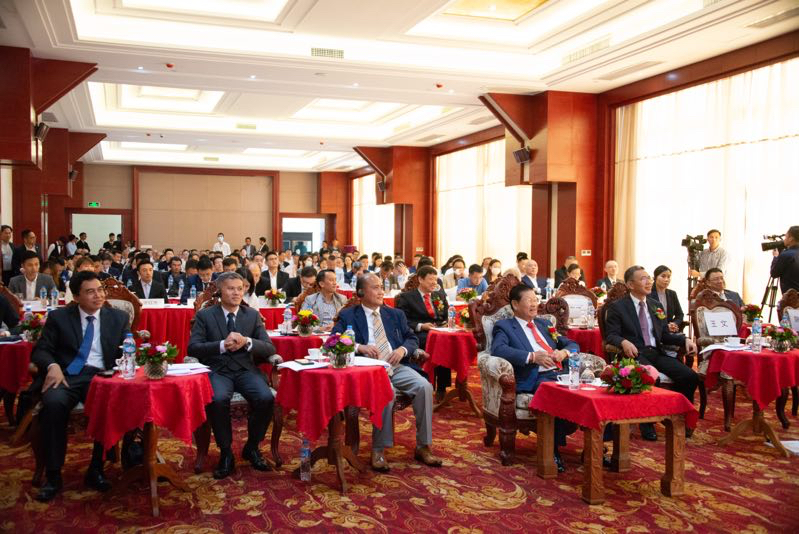
Parties in Laos provided strong support for the BRI research delegation. Before the forum, the delegation organized field visits and exchanges, took the China-Laos Railway to Vientiane, the capital of Laos. The delegation conducted field research on some representative cases and projects related to the BRI, such as Phon Hong Railway Logistics Park, Lanxang Culture Parkand AIF Group.
During the opening remarks at the Forum, Wang Wen, Executive Dean of RDCY, presided over the opening ceremony and Zhao Wenyu, Commercial Counselor of the Embassy of the People’s Republic of China in Laos, delivered an opening speech on behalf of Ambassador Jiang Zaidong. Zhao Wenyu said that the cooperation between China and Laos has been ever-strengthening for a long time, and the high levels of political mutual trust are the biggest advantage of the two countries in building high-quality BRI cooperation. China is willing to deepen cooperation with Laos, share the new opportunities for development and China's big market, work together to conduct high-quality BRI cooperation, and actively promote the common prosperity and development of both China and Laos and the continuous improvement of people's living standards.

(Commercial Counselor of the Embassy of the People’s Republic of China in Laos Zhao Wenyu)
Subsequently, Liu Jintao, Associate Research Fellow of RDCY, released a research report entitled the Green Development of China and ASEAN under the Belt and Road Initiative: A Case Study of China-Laos Railway, which was based on the solid foundation of China and ASEAN’s joint efforts to BRI construction. The report analyzes the prospects and needs of ASEAN in green development as well as the economic, financing and trade challenges faced by the green cooperation between China and ASEAN under the BRI. It also points out the commercial, environmental and financial value of China-Laos Railway's green cooperation, and provides a glimpse into the future green cooperation between China and ASEAN.
The keynote speech of the forum was presided over by Viengsavang Thipphavong, Deputy Director General of IIC, and the guests from both sides expressed their views on China-Laos economic and trade cooperation under the BRI.
Chen Wenling, Chief Economist of China Center for International Economic Exchanges (CCIEE) and former Director General of the Research Office of the State Council, believed that BRI has brought significant historical opportunities to most countries in the world, and that the China-Laos Railway is not only a railway line, but also a "golden key" connecting China, Laos, Thailand and other ASEAN countries. China is bringing hope and opportunities to the countries and people participating in the BRI construction with concrete actions and major projects, which are witnessed by people across the globe.
Sitthiroth Rasphone, Director General of Development Research Institute (DRI) of Ministry of Planning and Investment, suggested that the China-Laos Economic Corridor will provide opportunities for trade and investment activities, contribute to productivity enhancement in Laos, and promote the development and sustained prosperity of the areas along the China-Laos Railway, thus improving the well-being of the Lao people. It will also further strengthen infrastructure connectivity among various regions and countries, enhance economic cooperation, reduce circulation costs, improve circulation efficiency, and promote regional economic integration.
Hu Xijin, former editor-in-chief of Global Times, discussed the people-to-people exchange between China and Laos under the BRI from the perspective of China-Laos friendship. He said that the Chinese people highly respect Laos and they gave the Chinese character "Wo(挝)" to this beautiful country.
Chanhphasouk Vidavong, Director of Trade Policy Research Division of IIC, believed that there is a significant prospect for China-Laos bilateral trade with the development of the China-Laos Railway, and that China-Laos trade will be full of vitality under the BRI.
During the roundtable dialogue, guests from China and Laos had a lively discussion on the future of China-Laos cooperation under the BRI.
Ding Gang, senior editor of the People’s Daily, senior consultant to the Global Times and senior fellow of RDCY, suggested promoting direct cooperation among rural farmers between China and Laos, such as conducting cooperation projects in coffee planting, carrying out coffee planting pilot projects, promoting advanced coffee planting technology, training farmers to enhance their coffee planting and processing skills, and improving the added value and competitiveness of the coffee industry. At the same time, this method of developing quality agriculture can be applied in the production of fruits, vegetables, nuts and other agricultural products. Besides, with China's experience in poverty alleviation, microcredit can be offered to further agricultural cooperation and promote farmers’ business cooperation from both countries and seek more opportunities for win-win cooperation.
Toulany Thavisay, Deputy Head of Business Subject at Faculty of Economics and Business Management (FEB) of National University of Laos, presented a recent study and suggested introducing more attractive incentives for more investment and better business environment through promotional policies to raise awareness and understanding about the BRI in Laos.
According to Lu Yang, a research fellow of Belt and Road Research Institute at Tsinghua University, BRI is an international public good and a platform for international cooperation, of which policy communication is an important guarantee for promoting the BRI cooperation, infrastructure connectivity is a priority, smooth trade is an essential element, financial integration is a key support, and people-to-people communication is a humanistic foundation, while the China-Laos Railway also serves as an important carrier for China and Laos to build a community of shared destiny and enhance the mutual trust and common prosperity between China and ASEAN countries.
Inpong Inthavong, Deputy Director of Division of International Cooperation from Department of Planning and Cooperation in Ministry of Agriculture and Forestry, put forward suggestions for China-Laos agricultural cooperation under the BRI, saying that both countries should continuously strengthen border trade and border forestry cooperation, enhance border forest fire prevention, wildlife protection and pest control, focus on suppressing and combating illegal logging, and protect forestry security in border areas.
According to Somdeth Bodhisane, Deputy Director of Industry Policy Research Division of IIC, BRI, a development initiative proposed by China in 2013, aims to strengthen connectivity and cooperation among Asia, Europe and Africa. Logistics and transport, which facilitate the flow of products, services and the movement people among participating countries, play a crucial role in the BRI.
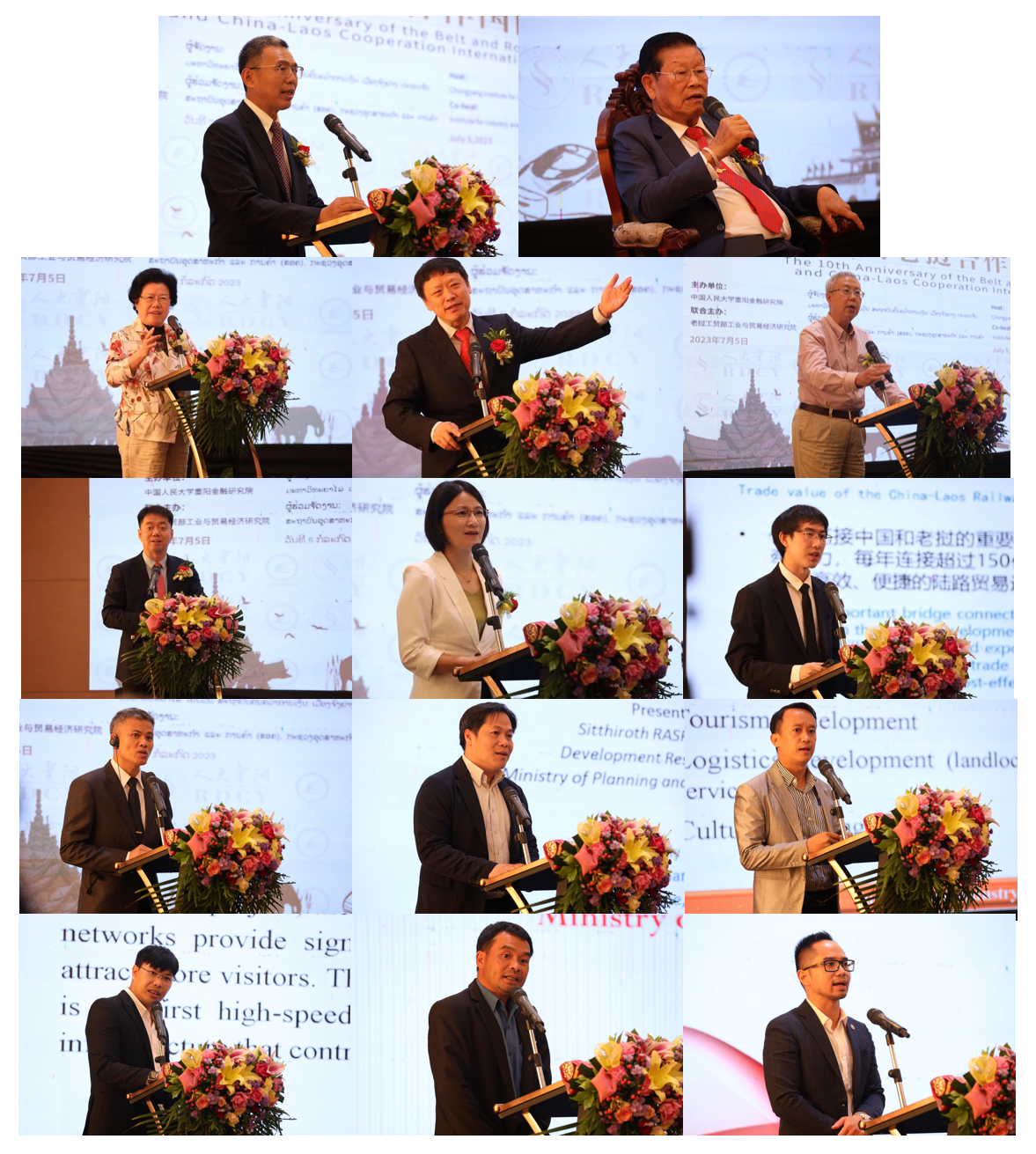
In the closing session, Wang Wen, Executive Dean of RDCY, had a discussion with H.E. Somsavat Lengsavad, former Deputy Prime Minister of the Lao PDR. H.E. Somsavat Lengsavad answered questions from journalists and pointed out that the greatest significance of BRI for Laos is that it has not only promoted official cooperation, but also boosted the confidence of the Lao and Chinese people to enhance understanding and strengthen exchanges. The life of the Lao people has been improved because of the BRI, which is the best interpretation of the China-Laos community of common destiny. As the decision maker of building the China-Laos Railway, Somsavat believes that under the BRI, the fruits of the cooperation between Laos and China have made the world impressed. In the cooperation process, infrastructure is the most important factor, and the China-Laos Railway has brought an engineering and economic miracle not only in Laos but also in the whole ASEAN region. Somsavat also pointed out that building special development zones has become an important method for Laos to achieve regional economic take-off, and Laos will continue to explore more effective management methods and gain valuable hands-on experience.

(Left: Former Deputy Prime Minister of the Lao PDR, H.E. Somsavat Lengsavad
Right: Executive Dean of RDCY, Wang Wen )
The success of this forum has given an important impetus to the BRI cooperation between China and Laos. Under the guidance of the China-Laos Railway and other projects, China and Laos will continue to deepen the key concept of building a "community with a shared future for mankind" and form a closer BRI international partnership with each other.
Related Articles:
1. ໜຶ່ຶງແລວໜຶ່ງເສັ້ນທາງ ນຳເອົາຜົນປະໂຫຍດມາໃຫ້ ສປປ ລາວ
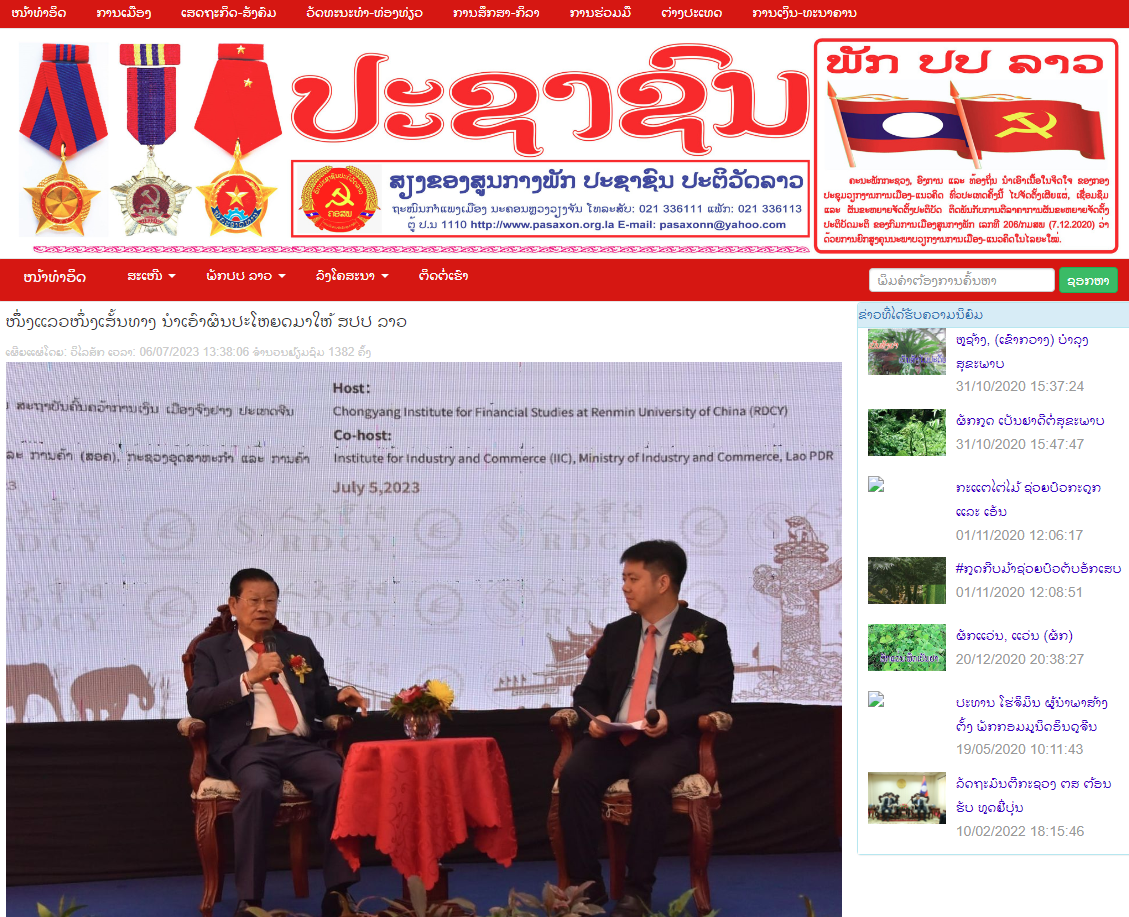
2. ຈັດສຳມະນາວິຊາການ ສະເຫຼີມສະຫຼອງ 10 ປີ ແນວຄວາມຄິດລິເລີ່ມ ໜຶ່ງແລວໜຶ່ງເສັ້ນທາງ ແລະ ການຮ່ວມມື ລາວ-ຈີນ
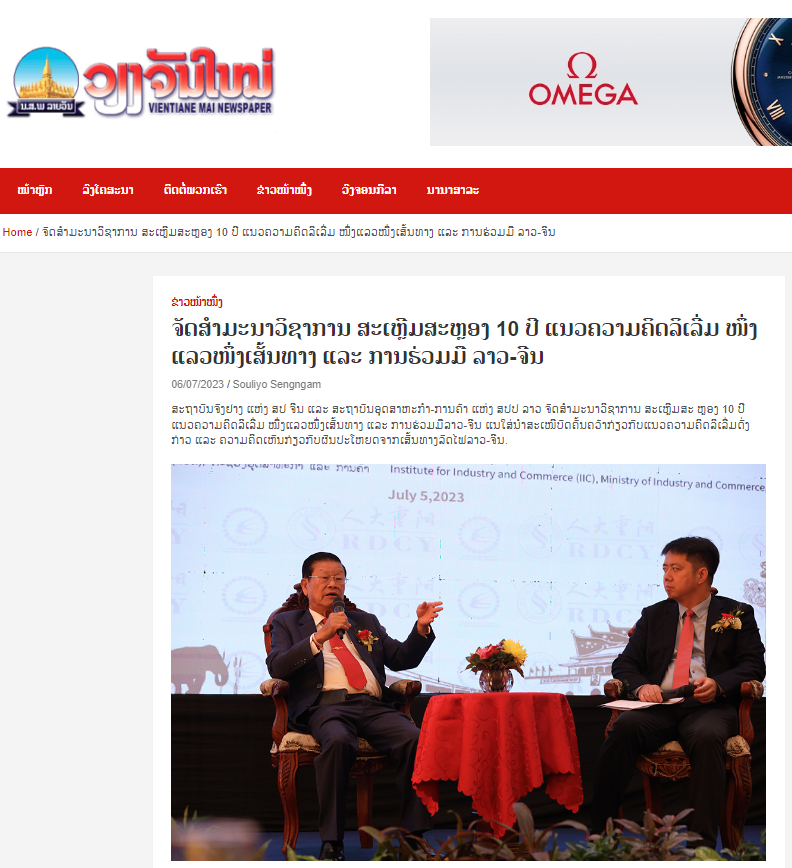
3. BRI’s 10th anniversary celebrated in Vientiane
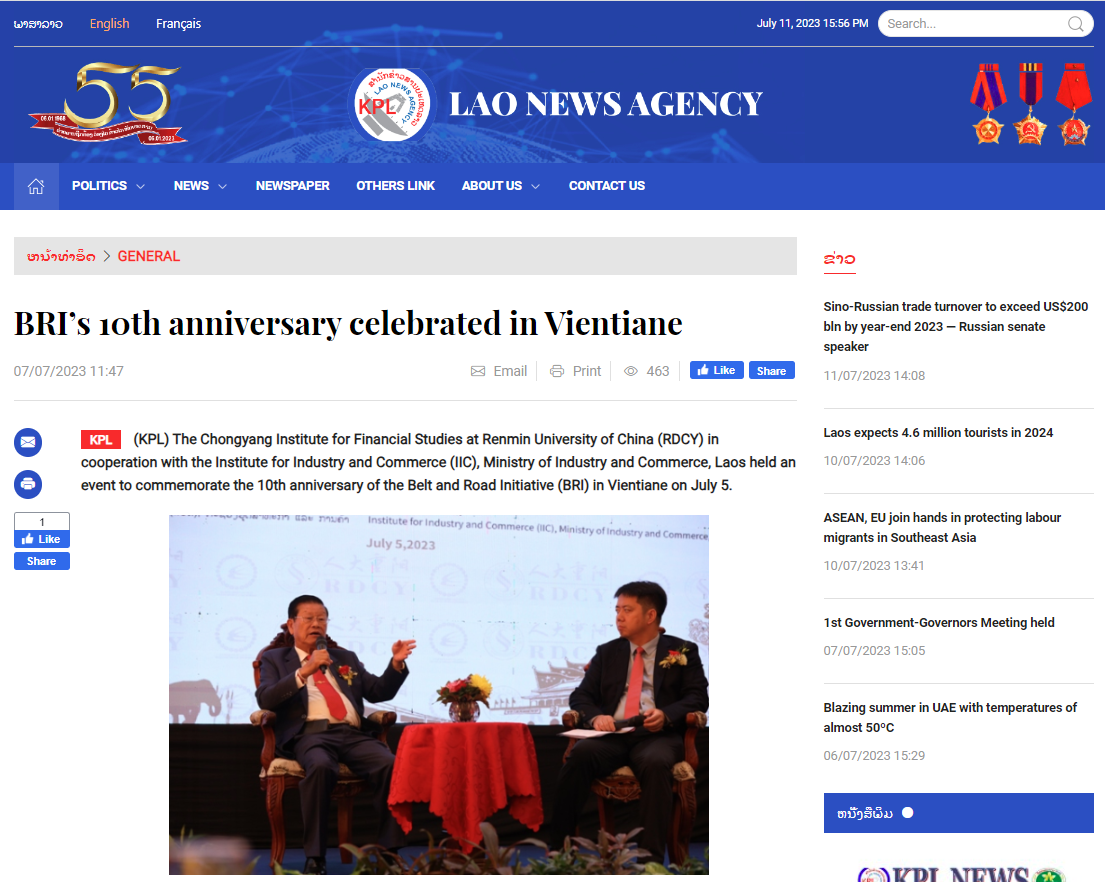
4. China-Laos Railway sets good example for low-carbon collaboration under BRI
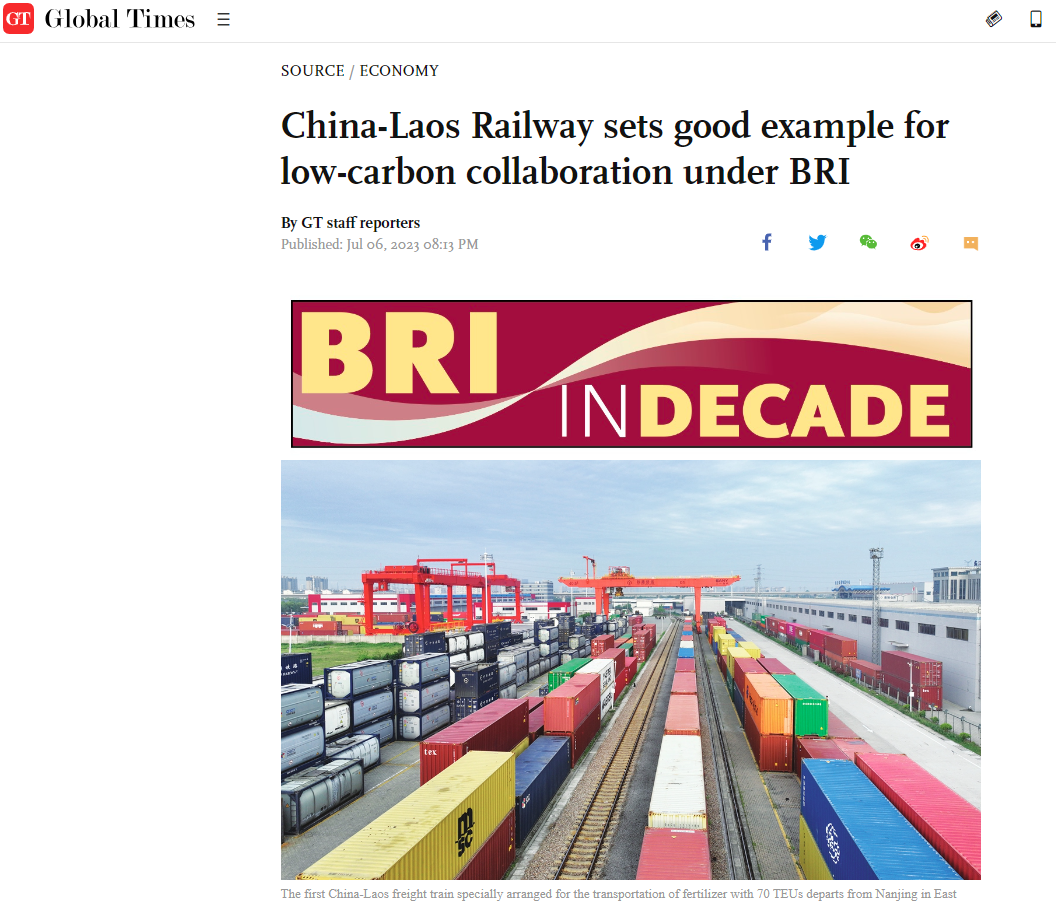
5. China-Laos Railway: Win-win China-ASEAN green development under BRI
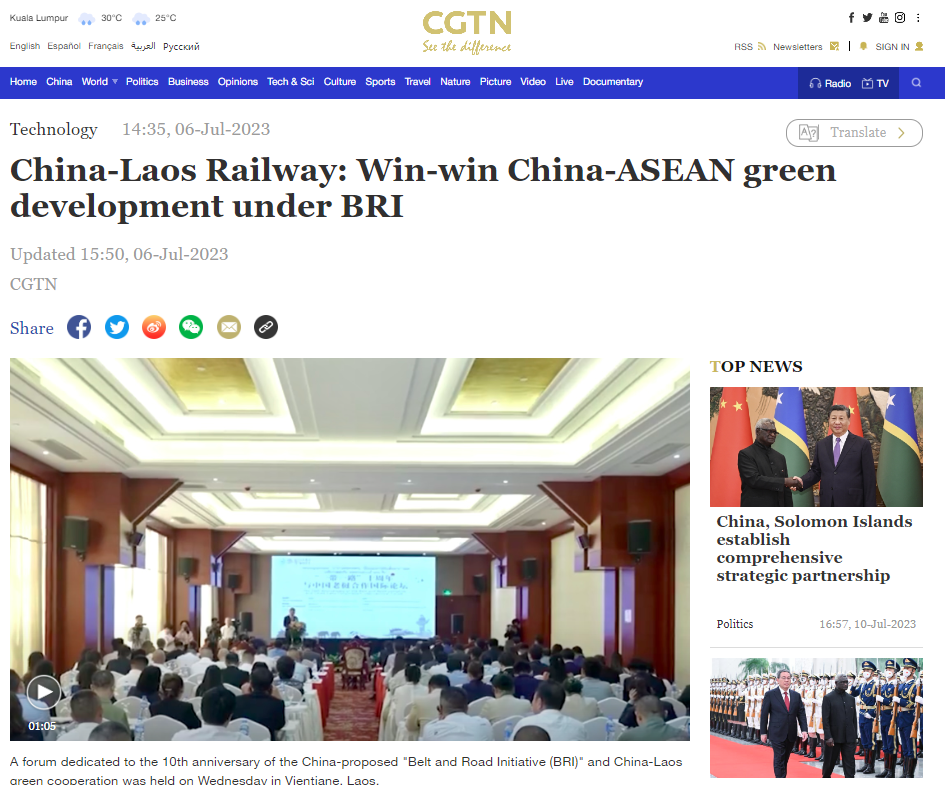
Key Words: Laos, ASEAN, China-Laos Railway, BRI























































































 京公网安备 11010802037854号
京公网安备 11010802037854号





